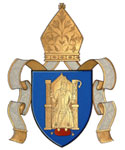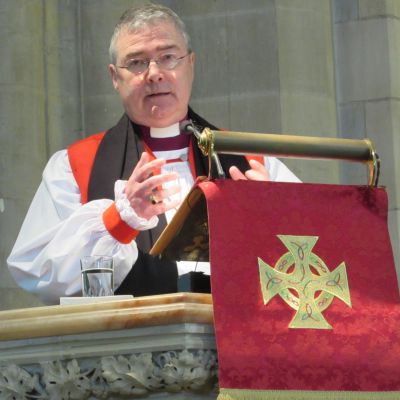 |
 |
News
Bishop of Clogher preaches at the General Synod Eucharist in St. Patrick’s Cathedral, Armagh

The Bishop of Clogher Right Revd John McDowell.
The Bishop of Clogher, Right Revd John McDowell, was the preacher at the General Synod Eucharist in St. Patrick’s Cathedral, Armagh on Thursday (Ascension Day), 10th May 2018.
Preaching from Acts Chapter 1, Ephesians Chapter 1 and Luke Chapter 24 on the theme of the Ascension of Christ and the giving of gifts and vocations by Jesus to the Church to work towards the fulfilment of His Kingdom, he said: “The General Synod is one of the distinctive means whereby we exercise the gifts of discernment and government which the ascended Lord gives to His Church for the building up of the Kingdom …
“For Anglicans, there is certainly immense spiritual importance in considering any liturgical provision because our corporate worship is not only the expression, but also the source, of our belief. Our lives out there are shaped by what we do and say and receive in here. And what could be more expressive of the compassion of God than the consideration of a pastoral office for use in the heart-breaking circumstances of a miscarriage or a stillbirth or a neo-natal death? Or a debate about how we can best use our investments to care for His creation.’
A full transcript of Bishop McDowell’s sermon is below;
“This is a ‘busy’ day in the life of the Church of Ireland. It is the first day of the 148th General Synod. It is the Feast Day of St Comgall, Abbot of Bangor, to whom is attributed that saying about a person without a soul friend is like a body without a head. But also and, of course pre-eminently, it is the Ascension Day, one of the principal festivals of the Church.
“The Ascension of Our Lord presents some challenges, not so much to faith as to the imagination. It was Athanasius in his controversy with Arius who said: ‘When Christ sat down at the right hand of the Father, he did not put the Father on his left.’ However, we have Luke’s Gospel to witness to us that it was an event and not merely a state of mind, and we have the letters to the Ephesians and to the Hebrews to draw out the great consequences of that event.
“‘Do not hold me,’ said Jesus to Mary in the garden on the first Easter morning ‘for I have not yet gone to the Father.’
“The words which we shall soon say together, that ‘he ascended into heaven’ stand with equal authority beside ‘he was crucified, died and was buried’ and that ‘he rose again on the third day’.
“The Resurrection of Jesus Christ means that the renewal of all creation has begun. The resurrection is a moment of recovery. The recovery of the whole creation from the ‘futility’ that it had experienced. But it is not an end in itself. It does not simply leave us where Adam began, for the Ascension is a moment of advance onto a path of communion with God which never before existed. Access, as the writer of Ephesians says, to ‘the immeasurable greatness of his power for us who believe according to the working of his great power.’
“When Jesus Christ ascended to the Father and sat down at His right hand in glory, it did not signify a moment of rest. It signified a moment of triumph. The words used to describe the Ascension in the 39 Articles can be a bit misleading ��' ‘he ascended… and there sitteth until his return.’ It can sound as though He is killing time until something else turns up. Or to use an Ulster colloquialism, that He is sitting ‘with His two arms the one length.’ In traditional theology, this period between the Ascension and the Coming in Judgement is called the ‘Heavenly Session’. ‘Session’ is another word with not very helpful connotations here in Ireland.
“Jesus Christ ascended and gave gifts to His Church. And with each gift comes a vocation. If there is in some sense a ‘waiting’ by Jesus Christ during the Heavenly Session, it is a waiting of expectancy for His Church to work towards the fulfilling of the words which He taught them: ‘Thy Kingdom come’.
“The General Synod is one of the distinctive means whereby we exercise the gifts of discernment and government which the ascended Lord gives to His Church for the building up of the Kingdom. Some of what we will discuss over the coming three days may not look very heavenly, but there is a grace in the efficient arranging of business and there is a goodness in the ordering of a Cathedral Chapter or the planning of future relationships between dioceses so as to carry out their mission more effectively.
“For Anglicans, there is certainly immense spiritual importance in considering any liturgical provision because our corporate worship is not only the expression, but also the source, of our belief. Our lives out there are shaped by what we do and say and receive in here. And what could be more expressive of the compassion of God than the consideration of a pastoral office for use in the heart-breaking circumstances of a miscarriage or a stillbirth or a neonatal death? Or a debate about how we can best use our investments to care for His creation.
“The ascended Christ has reached the fulfilment of mankind’s destiny. He is already at the end of time. We are still on that journey together and with a job of work to do in the Church and in the world. Sometimes that work will be heavy and sometimes it will be light. We may be called to do great things or little things but the scale or the weight of the tasks given to us as individuals or as a Church do not matter. What alone matters is the love with which we attempt to carry them out.”